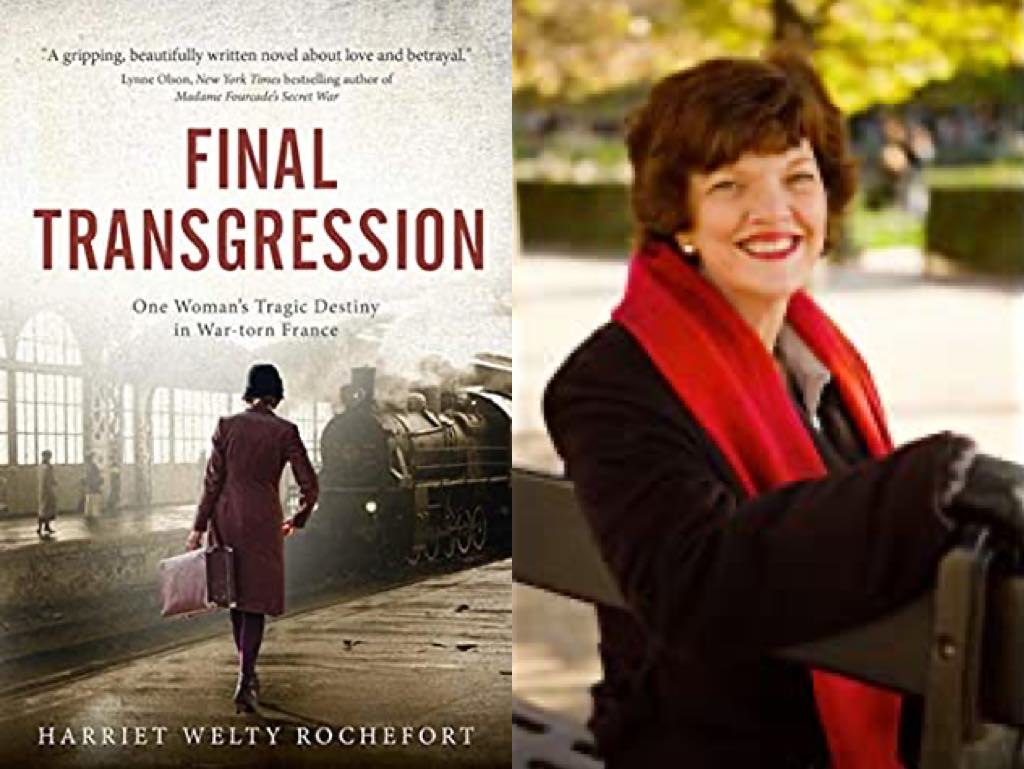What was it like to live in France under the Nazi occupation? What role would you have played in those grim circumstances: Resistance hero blowing up trains? Collaborator denouncing neighbors to the Gestapo? Or simply your average French citizen, cold and hungry, and just trying to get by? In her novel Final Transgression, set in that murky period of World War II, Harriet Welty Rochefort explores its existential dilemmas.
As the book shows, what made those times so dark and tragic was not only the Nazi regime’s brutal oppression but also the clashes between different factions within the French population, which led to cruel reprisals against alleged traitors. The French were at war with each other, as Welty Rochefort puts it.
Against this carefully researched background of historical upheaval, Final Transgression tells the fictional tale of lively, headstrong Sévérine Aubry, a beautiful (of course) young woman growing up in a village in southwestern France, in the chateau where her parents work as domestics. Bright and charming, she becomes the protégée of her parents’ employer, Countess Gisèle, who nurtures both her musical and social ambitions. Thanks to her Gisèle’s coaching, Sévérine picks up the skills, manners and je ne sais quoi needed to fit in with the upper crust.
Sévérine and her beloved sister Caroline (older, wiser and less self-centered) move to Paris, where they pursue their different dreams. Caroline becomes a dress designer. Sévérine gives piano lessons, but a marriage proposal from Antoine, a dashing, wealthy jeweler, offers a shortcut to the good life. She takes it. Antoine loves going out on the town and showing off his attractive wife to le tout Paris, while her deepest desire is simply to have children.
Then the Nazis invade. For Sévérine, thanks to her pro-Pétain husband’s connections, not much changes – the dinners at Maxim’s and La Tour d’Argent continue. But in the spring of 1944, Sévérine discovers Antoine’s particularly heartless betrayal: he’s not only a collaborator, which she can rationalize, he’s a cad.
She recklessly decides to move back to her childhood village, Sorignac, where her revered mentor, the countess, and her first sweetheart, the local doctor, still live. She ignores her sister’s warnings about the area’s multiple dangers, and not just Nazi atrocities (a harrowing scene evokes the massacre of 642 villagers in Oradour-sur-Glane in 1944). Rogue maquisards are pillaging farms and even the post office to meet the needs of the Resistance. Communists, agents of the pro-German Vichy government and General de Gaulle’s supporters, not to mention Catholics and Freemasons, are all fueling the violence.
In the end, it is Sévérine’s own obstinacy that brings on the book’s sad denouement as the past catches up with her. Not everyone in the village, it turns out, was happy to see the caretaker’s daughter triumphantly transformed into a sophisticated Parisienne. She has to confront a spurned suitor, another betrayal and unsuspected foes. The outcome is predictable – the book’s subtitle is “One woman’s tragic destiny in war-torn France” – but nonetheless shocking.
Final Transgression has a convoluted timeline. It begins in 1994 on the 50th anniversary of D-Day, when we discover that older sister Caroline has never told anyone what happened to Sévérine; she has, however, divulged the secret in a book she has written so her son can learn about the family history when she dies. That narrative starts with Sévérine’s 1944 train journey back to her hometown. The rest is filled in with flashbacks.
This is long-time Paris resident Welty Rochefort’s first novel, but not her first book. Her three earlier works – French Toast, French Fried and Joie de Vivre – have earned her a loyal following as a cultural ambassador. Each of these light-hearted but informative tomes is based on her experiences as an American journalist (born in Iowa) who married a Frenchman (Philippe, a historian) and embarked on a voyage of discovery that she shares with the rest of us who are trying to understand the French. Thanks to her books, we learn the arcane rules of French dinner parties and avoid faux pas or, as the French would say, putting our feet in the platter (mettre les pieds dans le plat).
Final Transgression deals with darker, sometimes taboo subjects, but it is also derived from Welty Rochefort’s bicultural life and inspired by a wartime mystery involving a member of her husband’s family. And, besides telling us in vivid detail about life during the Occupation (who knew that the German occupiers were nicknamed Doryphores, or potato beetles, as well as Boches), it offers a view of French mores, including the rigid social hierarchy and codes of marital infidelity, and provides valuable insight into the complicated French psyche that we expats spend our lives trying to decipher.
Note: The reviewer has been a friend of the author’s since their reporting days in the late lamented Time-Life Paris bureau, where she was the People correspondent.
Favorite
